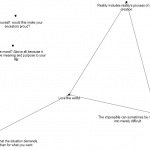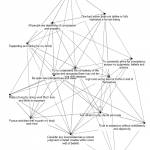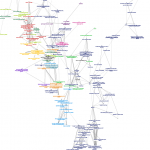Mitt Romney hurt himself in the 2012 campaign by saying that only 47% of the American people were “makers,” while an outright majority were “takers.” This thesis came from Arthur Brooks and Nicholas Eberstadt. They have argued that people who receive more than they pay into the welfare state will vote to expand it. They have also argued that the proportion of net beneficiaries has risen to become, for the first time, a majority. They see that shift in the political balance as fatal to capitalism. In the age of Ronald Reagan, conservative economic proposals often had a populist and majoritarian ring, but now some leading laissez-faire thinkers are hostile to majoritarian democracy on the grounds that the mass public has lost its commitment to free enterprise.
I don’t know if it has been noted that the current right-wing argument is a mirror-image of the left-wing diagnosis popularized in the late 1950s by John Kenneth Galbraith. The concern then was that a majority had become bourgeois, leaving an outvoted minority in real deprivation. Just as today’s American Enterprise Institute economists dread that voters will kill capitalism, so Galbraith and his social democratic colleagues feared the death of the welfare state at the hands of an affluent majority.
In the Affluent Society, 1958 (40th anniversary edition, p. 235), Galbraith argued that cumulative postwar economic growth had “reduce[d] poverty from the problem of a majority to that of a minority. It ceased to be a general case and became a special case. It is this which put the problem of poverty into its peculiar modern form.”
He explained (pp. 238-9):
With the transition of the very poor from a majority to a comparative minority position, there has been a change in their political position. Any tendency of a politician to identify himself with those of the lowest estate usually brought the reproaches of the well-to-do. Political pandering and demagoguery were naturally suspected. But, for the man so reproached, there was the compensating advantage of alignment with a large majority. Now any politician who speaks for the very poor is speaking for a small and generally inarticulate minority. …
In consequence, a notable feature of efforts to help the very poor is their absence of any great political appeal. Politicians have found it possible to be indifferent where they could not be derisory. And very few have been under a strong compulsion to support these efforts.
The concern for inequality and deprivation had vitality only so long as the many suffered while a few had much. It did not survive as a decisive issue in a time when the many had much even though others had much more. It is our misfortune that when inequality declined, the slate was not left clean. A residual and in some ways rather more hopeless problem remained.
I think Galbraith was right at the time. His argument implied that Reaganite/Thatcherite conservatism would be popular–and its time came. But that doesn’t mean that Romney et al. are completely wrong in their political diagnosis today. Nearly forty years of declining living standards for the median voter and rising economic inequality could shift the balance back in favor of redistribution.
See also “Ulrich Beck v Mitt Romney: makers and takers in the Risk Society” and
“why is oligarchy everywhere? (part 2).”


